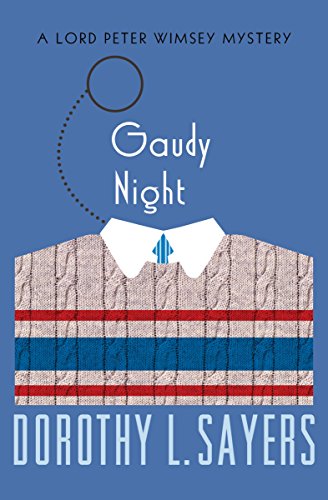
She paused. “I know what you’re thinking—that anybody with proper sensitive feeling would rather scrub floors for a living. But I should scrub floors very badly, and I write detective stories rather well. I don’t see why proper feeling should prevent me from doing my proper job.”
I have reached the penultimate installment in Dorothy L. Sayers’ immortal Lord Peter Wimsey series. Gaudy Night is probably not Miss Sayers’ best mystery novel, nor by any means her most popular. But it carries the satisfaction of finally bringing the Harriet Vane cycle to its proper culmination (though she’s in the final book too, and rightly so).
Harriet Vane is a popular mystery novelist who once stood in the dock on trial for her life. Lord Peter Wimsey saved her from the gallows, and ever since he has been courting her in a low-key manner, aware that she has a low opinion of herself and is chary about new relationships.
In this book, Harriet goes back to her college (the fictional Shrewsbury – a sly choice of name – a women’s college at Oxford University) for a Gaudy Night – a school reunion. She’s nervous about her reception, but it goes surprisingly well. The only real blot on her experience is a nasty note someone tucked into the sleeve of her academic gown – but she shrugs that off.
Soon after, she gets a letter from the Dean, inviting her to the opening of the new library. She also wants Harriet’s advice on a problem they’re having. Crude notes like the one she received are showing up more and more frequently, and there’s been minor vandalism. Harriet is a mystery writer – maybe she can ferret out the culprit – discreetly, of course.
Harriet is delighted to go, and plunges into the scholarly life. She even takes up research with an idea to earning her Master’s degree. But the poison pen writer is getting more and more aggressive – even to the point where lives are put in danger. In the end, it will take Lord Peter to come in and, with an objective eye, resolve the mystery.
The theme of the book is Dorothy Sayers’ recurring theme in all her work – vocation. She believed strongly that there was a moral obligation for a person to work at whatever God has best equipped them to do, rather than what society says they should do. (She and C. S. Lewis differed on that subject, and lived the consequences out in their personal lives.)
As one who knows the British university system only second-hand, I found some matters confusing. And I also had trouble keeping the scholarly characters straight. Nevertheless, I enjoyed watching Harriet’s journey to greater insight. This book is mostly Harriet’s, after all. Lord Peter only comes in at the end.
Recommended, of course.
